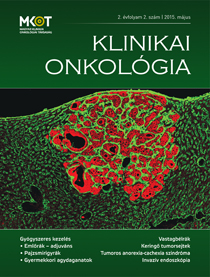The eLitMed.hu medical portal uses computer cookies for convenient operation. Detailed information can be found in the Cookie-policy.
Clinical Oncology - 2015;2(02)
Content
[Adjuvant chemotherapy for operable breast cancer]
[The use of adjuvant chemotherapy in early stage breast cancer has made signifi cant progress in the last decades. This review will focus on the benefi cial effects of different chemotherapy regimens on the risk of recurrence and breast cancer mortality.]
[Chemotherapy of the thyroid cancer]
[The incidence of thyroid cancers increased signifi cantly over the past few decades, but the mortality rate decreased. The clinical course and therapy for the three types of thyroid cancer (differentiated, medullary and anaplastic) are different. The medical therapy consists of levothyroxin therapy, conventional chemotherapeutic agents and tyrosin kinase inhibitors. The aim of this review is to summarize the therapeutic options of each histological subtype.]
[Diagnosis and therapy of childhood brain tumors – an update]
[Childhood cancers are rare disorders. The average annual age-standardized incidence is 149/1000000 (0-14 yrs). Diagnosis of childhood brain tumors, despite the specifi c localization and advanced imaging techniques can cause diffi culties. In recent years, due to better early recognition, number of surgically removable brain tumors is increasing. Early detection of the disease (clinical knowledge), use of modern imaging (fMRI) techniques and detection of characteristic molecular lesions allow up-to-date diagnosis and successful treatments. These approaches provide the basis for risk-adapted personalized treatment options]
[How the molecular informations infl uence the therapeutic strategy against colorectal cancer?]
[Colorectal cancer is not a homogenous disease, but it has different subgroups based on their molecular characteristics. NCCN and ESMO guidelines emphasize the importance of the determination of RAS and BRAF mutations in those patients who are intended to treat with targeted therapy. The increase in knowledge on the molecular changes will help to design and start a new generation of clinical trials, which will be designed not on their randomization of large groups of unselected patients, but rather on the consideration of the molecular subgroups determined before introducing therapy.]
[Circulating tumor cells - a promising new approach]
[It is an old observation, that tumor cells can escape from the primary, travel with the circulation, and fi nally be arrested in distant places. To know the potential „advantage” of this phenomenon (circulating tumor cells, CTC) is very important. One of the key questions is the proper sensitivity of isolation and characterisation techniques being able to represent the heterogeneity of tumorous clones. There is no doubt that the time arrived for the application of minimal invasive markers in oncology, with the hope that the survival of the patients can be improved using real-time monitoring and more effective therapy. The analysis of CTCs/cfDNA and other markers (e.g. miRNA, exosomes) obtained from the blood will be, hopefully, rutine tool in designing therapeutic strategy, and monitoring tumor response.]
[Nutritional support in cancer anorexia-cachexia syndrome]
[Cancer anorexia-cachexia syndrome (CACS) defi ned by ongoing loss of skeletal muscle mass, with or without loss of fat mass. In contrast to serious non tumorous cachexia it can not be reversed by conventional nutritional support. CACS affects most of cancer patients and has negative impact on physical function, anticancer treatment response, quality of life and survival. It is known that interactions between tumor and reactive host cells are responsible for tumor progression, metastasis formation and chronic infl ammation, as well. All of the processes are induced by cytokines. The CACS associated changes in carbohydrate, protein and lipid metabolism are caused by the elevated level of infl ammatory cytokines. The new anti-CACS drug development aimed at normalizing of the pathologic pathways. Up to now, megestrol-acetate (MA) administration seems to be the most effective drug in CACS treatment. MA has dual effect, stimulates the NPY activation and inhibits the synthesis and expression of infl ammatory cytokines. Its clinical effects are on line with the aboves, improves appetite, calorie intake and increases body weight. There is paradigm shift in CACS treatment, the traditional nutritional support is replaced by combination of pharmaceutical interventions, nutritional support and use of dietary supplements.]
[Invasive endoscopy in oncology]
[Recent advances in interventional gastrointestinal endoscopy have led to a large variety of new diagnostic and minimally invasive endoscopic surgical procedures in oncological patients. Endoscopic ultrasound with the possibility of fi ne needle aspiration is currently one of the most accurate imaging technology for adequate staging of gastrointestinal cancers including oesophageal, gastric, rectal and pancreatic cancer. Endoscopic mucosal resection and endoscopic submucosal dissection offers a minimal invasive endoscopic treatment modality as an alternative for laparoscopic surgery for patients with early intramucosal neoplasias, fl at adenomas and laterally spreading tumors of the oesophagus, stomach, duodenum and colorectum. Self-expandable metal stents are now readily available for endoscopic palliation of different type of malignant gastrointestinal obstructions including oesophageal, duodenal, colonic and biliary stenosis. These recent developments of interventional gastrointestinal endoscopy lead to more precise and accurate tumor staging and more effective oncological therapy for patients with gastrointestinal cancers.]
1.
Clinical Neuroscience
Is there any difference in mortality rates of atrial fibrillation detected before or after ischemic stroke?2.
Clinical Neuroscience
Factors influencing the level of stigma in Parkinson’s disease in western Turkey3.
Clinical Neuroscience
Neuropathic pain and mood disorders in earthquake survivors with peripheral nerve injuries4.
Journal of Nursing Theory and Practice
[Correlations of Sarcopenia, Frailty, Falls and Social Isolation – A Literature Review in the Light of Swedish Statistics]5.
Clinical Neuroscience
[Comparison of pain intensity measurements among patients with low-back pain]1.
Clinical Neuroscience Proceedings
[A Magyar Stroke Társaság XVIII. Kongresszusa és a Magyar Neuroszonológiai Társaság XV. Konferenciája. Absztraktfüzet]2.
3.
Journal of Nursing Theory and Practice
[A selection of the entries submitted to the literary contest "Honorable mission: the joys and challenges of our profession" ]4.
Journal of Nursing Theory and Practice
[End of Life and Palliative Care of Newborns in the Nursing Context]5.
Journal of Nursing Theory and Practice
[Aspects of Occupational Health Nursing for Incurable Patients ]


